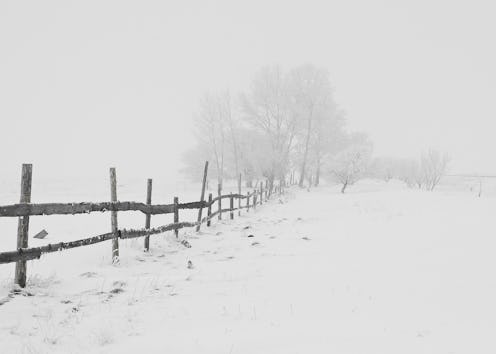Life
Signs You’re Allergic to Cold Temperatures

It's one thing to be chilly, but it's quite another thing to get an adverse reaction that seems definitely not normal. If you're experiencing weird signs that you're allergic to the cold, you're not delusional: it's actually a totally real phenomenon that can happen to anyone susceptible. It's even more likely that you're allergic if the allergy runs in your family, as it can be passed down genetically.
As a certified health coach, I always encourage clients to be aware of their genes and allergies, and if they notice any weird symptoms or changes in their bodies or temperaments, to re-evaluate any possible incidences. As a side note, I am always cold. My mother is actually allergic to the cold (I don't think I am, though I need my thermostat to be 80 degrees to feel normal); her lips and hands swell, and her cheeks stay bright red for hours. If you notice these signs, you might have the allergy too.
Here are nine ways to know if there might be something off with your tolerance to cold weather. If you notice a pattern, it's nothing to be too worried about, but it's definitely worth getting to the bottom of so you can be better prepared during the winter.
1. Red & Itchy Skin
According to Eileen Wang, MD, MPH, allergist assistant professor of medicine at National Jewish Health in Denver, in an email with Bustle, "if you get red, itchy, and swollen skin five to 30 minutes after exposure to the cold, you may have cold urticaria. It is often called cold allergy." Wang continues, "a common test for diagnosing cold urticaria is to put an ice cube on your forearm for a few minutes and see if your skin becomes red, itchy and develops a bump. (There is risk for actual damage to the skin with direct ice cube application therefore I’m not recommending this outside of a clinical setting.)"
2. Swelling Of Lips & Hands
Wang also mentions that "swollen lips" and "swollen hands" can occur when someone who is allergic to the cold is exposed to frosty temperatures or are holding a cold beverage. If this starts to happen, consider drinking from a straw to keep your hands and lips a bit safer from the chilly temperature.
3. Swelling Of The Throat
"While most suffer from itchy welts or hives, some have experienced severe reactions. These include difficulty breathing from swelling of the throat and anaphylaxis after more intense exposures such as jumping into very cold water," says Wang. This could be pretty scary, so check with a doctor if you think you're allergic to the cold and are experiencing such symptoms.
4. Fever & Joint Pain
"There is a familial condition, known as familial cold autoinflammatory syndrome (FCAS), in which patients suffer recurrent fevers and joint pain in addition to itchy, red welts upon exposure to the cold," says Wang. "Onset of symptoms is usually slower, in the range of an hour or more, and can last longer, for 12 hours to days. This is a serious condition and you should consult a physician if you think you have FCAS," Wang warns.
5. Changes In Skin Color
"Raynaud’s disease is another common reaction to cold. Upon exposure to cold, blood vessels, especially in fingers and toes, constrict, first making skin white, then blue and finally red when blood flow returns," says Wang. "Raynaud’s disease is more common in women."
6. Headache & Anxiety
"If you're like me, the cold temperatures can be annoying to you. However, there are some people who are actually allergic to the cold temperatures," says Dr. Partha Nandi M.D., F.A.C.P, creator and host of the Emmy-award winning medical lifestyle television show, “Ask Dr. Nandi” and Chief Health Editor at WXYZ-TV (ABC) Detroit over email with Bustle. Nandi says that patients can experience headaches and anxiety. "This can happen in cold weather as well as exposure to cold water with swimming and even the air conditioner in some cases! Research shows that this can run in families as well," Nandi adds.
7. Hives & Rashes
Nandi cautions against hives and rashes in people who are allergic to cold temperatures. Redness and swelling is also very common. If you notice any weird hives or itchy rashes when you're in a cold area, the allergy could be to blame.
8. Dizziness
According to experts at Mayo Clinic, feeling dizzy is common in those who suffer from an allergy to cold temperatures. If you're lightheaded upon being exposed to chilly environments, it might be worth seeing a physician to discuss a proper diagnosis.
9. Burning Sensation
David Lang, M.D., section head of allergy and immunology at the Cleveland Clinic, told weather.com that a burning sensation, due to welts and rashes, especially on the legs, can happen when you're prone to the allergy. These can be really painful, so it might be worth speaking to a doctor or getting antibiotics for treatment.
If you notice any of these symptoms, it might be worth seeking help in minimizing the symptoms. If it runs in your family, you can be especially cautious.